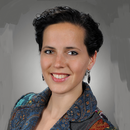The Hopp Children’s Cancer Center Heidelberg (KiTZ) is a joint institution of the German Cancer Research Center (DKFZ), Heidelberg University Hospital (UKHD) and the University of Heidelberg (Uni HD).
Sarcomas, highly aggressive tumors that develop in bones and soft tissue, are the third most common type of cancer in children and adolescents. They also include epithelioid sarcomas (EpS), which develop in the hands and feet, for example. Although these tumors are rare, they are often detected late and are then difficult to treat.
The research group led by Thomas Grünewald at KiTZ and DKFZ wants to change this and is researching the molecular causes in order to develop modern treatment options with fewer side effects. It has been supported for many years by the association SMARCB1 e.V. With the 20,000 euros that have now been handed over, the total amount donated in recent years amounts to an impressive 95,000 euros.
The funds will specifically benefit a project in which the researchers are targeting a molecular weakness that EpS and other sarcoma subtypes have in common: The SMARCB1 gene is defective in almost 90 percent of all EpS. SMARCB1 plays a central role in the regulation of genes. The loss of SMARCB1 severely disrupts this mechanism and it is assumed that this triggers tumor growth.
However, Thomas Grünewald's team was able to prove that this gene can be reactivated with the help of genetically modified cell lines. The aim is now to conduct further genetic research into this type of tumor and to use the results to test new treatment approaches in laboratory models.
"We are extremely grateful to the SMARCB1 association for their continued support of our research into epithelioid sarcoma. Without the sustained support, we would not be able to maintain our research efforts for such a rare but aggressive disease," says Grünewald.
About the association SMARCB1 e.V.
SMARCB1 e.V. is pursuing its own path by focusing on a group of sarcomas that share a common feature. Recognizing the importance of SMARCB1 places this gene and its tumors in the focus of its research funding. The association supports research projects on this group of tumors ideally and financially and wants to initiate its own research projects in the long term. The prerequisite for this is the acquisition of financial resources. In order to achieve these goals, SMARCB1 e.V. wants to attract stakeholders in the research field and raise public awareness of the importance of the topic. Anyone can join us on this path so that sarcomas are no longer the "forgotten cancer".




